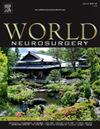Evaluation of an antithrombotic surface coated flow diverter in rabbit model.
IF 1.9
4区 医学
Q3 CLINICAL NEUROLOGY
引用次数: 0
Abstract
OBJECTIVE Flow diverters (FDs) carry the risk of thromboembolic complications associated with the device and bleeding complications associated with dual antiplatelet therapy. We hypothesize that an antithrombotic surface coated flow diverter(BSCFD) would have less acute thrombus formation and better endothelialization on the device surface compared to uncoated flow diverter. METHODS An antithrombotic surface coated FD(BSCFD) was developed. Acute clot formation and chronic endothelialization over the device were assessed in 8 rabbit models comparing to its prototype FD(PFD) at 2 hours and 1 month by Scanning Electron Microscopy(SEM) and Histologic images. Nonparametric score data, including thrombus, injury, endothelialization, adventitial inflammation, intramural bleeding and intimal hyperplasia were compared between BSCFD and PFD using Kendall coefficient of rank correlation. RESULTS Parent artery and branch artery were patent on DSA in 8 BSCFDs and 6 PFDs. There was 1 intra-stent thrombosis in PFDs at 2 hours and 1 intra-stent stenosis in PFD at 1 month. SEM at 2 hours showed that large amount of blood cells adhered to the surface of all 4 PFDs, and no blood cells were found on the surface of all 4 BSCFDs. At SEM and histological analysis of 1 month, there were less inflammation(Kendall's Tau-B=-0.818, p=0.022), less vessel wall injury(Kendall's Tau-B=-0.764, p=0.032)and better endothelialization(Kendall's Tau-B=0.818, p=0.022) in BSCFDs. CONCLUSION In the rabbit model, the BSCFD is associated with less thrombus formation at acute stage, less inflammation, less vessel injury and better endothelialization on the device surface compared to the PFD.在兔子模型中评估抗血栓表面涂层血流分流器。
目的血流分流器(FDs)具有与设备相关的血栓栓塞并发症和与双重抗血小板治疗相关的出血并发症的风险。我们假设,与无涂层的分流器相比,抗血栓表面涂层分流器(BSCFD)的急性血栓形成更少,装置表面的内皮化更好。通过扫描电子显微镜(SEM)和组织学图像,在 8 只兔子模型中评估了该装置与原型 FD(PFD)在 2 小时和 1 个月后的急性血栓形成和慢性内皮化情况。使用 Kendall 秩相关系数比较了 BSCFD 和 PFD 的非参数评分数据,包括血栓、损伤、内皮化、临近炎症、血管内出血和内膜增生。2 小时时,PFD 有 1 例支架内血栓形成,1 个月时,PFD 有 1 例支架内狭窄。2 小时后的扫描电镜显示,所有 4 个 PFD 表面都粘附了大量血细胞,而所有 4 个 BSCFD 表面都没有发现血细胞。在1个月的扫描电镜和组织学分析中,BSCFD的炎症较少(Kendall's Tau-B=-0.818,p=0.022),血管壁损伤较少(Kendall's Tau-B=-0.764,p=0.032),内皮化较好(Kendall's Tau-B=-0.818,p=0.022)。结论在兔模型中,与 PFD 相比,BSCFD 在急性期血栓形成较少,炎症较轻,血管损伤较轻,装置表面的内皮化较好。
本文章由计算机程序翻译,如有差异,请以英文原文为准。
求助全文
约1分钟内获得全文
求助全文
来源期刊

World neurosurgery
CLINICAL NEUROLOGY-SURGERY
CiteScore
3.90
自引率
15.00%
发文量
1765
审稿时长
47 days
期刊介绍:
World Neurosurgery has an open access mirror journal World Neurosurgery: X, sharing the same aims and scope, editorial team, submission system and rigorous peer review.
The journal''s mission is to:
-To provide a first-class international forum and a 2-way conduit for dialogue that is relevant to neurosurgeons and providers who care for neurosurgery patients. The categories of the exchanged information include clinical and basic science, as well as global information that provide social, political, educational, economic, cultural or societal insights and knowledge that are of significance and relevance to worldwide neurosurgery patient care.
-To act as a primary intellectual catalyst for the stimulation of creativity, the creation of new knowledge, and the enhancement of quality neurosurgical care worldwide.
-To provide a forum for communication that enriches the lives of all neurosurgeons and their colleagues; and, in so doing, enriches the lives of their patients.
Topics to be addressed in World Neurosurgery include: EDUCATION, ECONOMICS, RESEARCH, POLITICS, HISTORY, CULTURE, CLINICAL SCIENCE, LABORATORY SCIENCE, TECHNOLOGY, OPERATIVE TECHNIQUES, CLINICAL IMAGES, VIDEOS
 求助内容:
求助内容: 应助结果提醒方式:
应助结果提醒方式:


